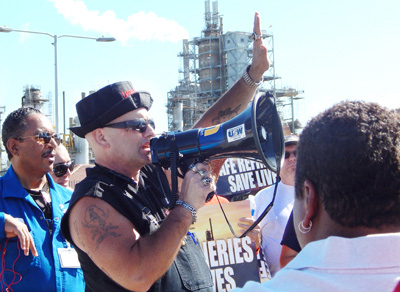
Vol. 79/No. 29 August 17, 2015
—ON THE PICKET LINE—
Maggie Trowe, Editor

Militant/Bernie Senter
Help the Militant cover steel, auto and other contract fights!
This column is dedicated to spreading the truth about the labor resistance that is unfolding today, to give voice to those engaged in battle and help build solidarity. National steel and auto contracts are expiring this summer and fall. I invite workers involved in fights against concessions to contact me at 306 W. 37th St., 13th Floor, New York, NY 10018; or (212) 244-4899; or themilitant@mac.com. We’ll work together to ensure your story
is told.
— Maggie Trowe
California Steelworkers protest
Phillips 66 refinery job cuts
WILMINGTON, Calif. — One hundred people joined a July 29 rally called by United Steelworkers Local 675 outside the Phillips 66 refinery here, protesting the company’s decision to eliminate jobs and increase the workload of existing employees.
“Three operators have two units each to watch,” a console and field operator, who asked that his name not be used, told the Militant. “They want to cut that to two operators watching those six units plus the blowdown flares. They are increasing the workload and decreasing the manpower. We are fighting because this is a safety concern for us.”
“When they cut back jobs it makes it more dangerous to work,” Jim Norris, first vice president of the local, told the crowd. Norris has worked 25 years as a field operator. “In 2005, an explosion in Texas happened because of not enough workers and they were working too many hours. We need more safe-ty. If we can win in California, we can carry it around the country.”
A few oil workers from the Tesoro refinery in nearby Carson joined dozens of Phillips 66 workers at the rally along with other unionists and people from the community.
South Bay 350 Climate Action Group publicized the rally. A July 26 statement on their website not-ed that bosses want “longer and longer shifts, with little rest in between and fewer skilled workers on duty. This profits over policy will place the refinery, its workers and surrounding community in dan-ger.”
Safety was a central issue in the nationwide selective strike earlier this year at 15 refineries and pet-rochemical plants. Unionists fought for the companies to hire more people and stop forcing them to work 12-hour shifts for weeks on end. The strike concluded with companies promising to review the problem of fatigue and forced overtime. The protest at the Wilmington refinery is an indication that the bosses have not altered the past practices that spawned the strike.
— Bernie Senter and Deborah Liatos
Related articles:
Steelworkers protest Allegheny Technology concession demands
Contract expires, talks go on between Verizon, unions
Townspeople angry about fatal fire at English mill
Front page (for this issue) | Home | Text-version home